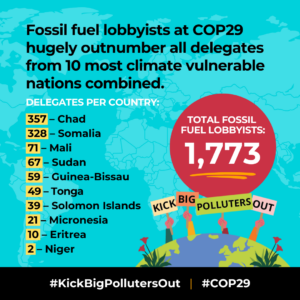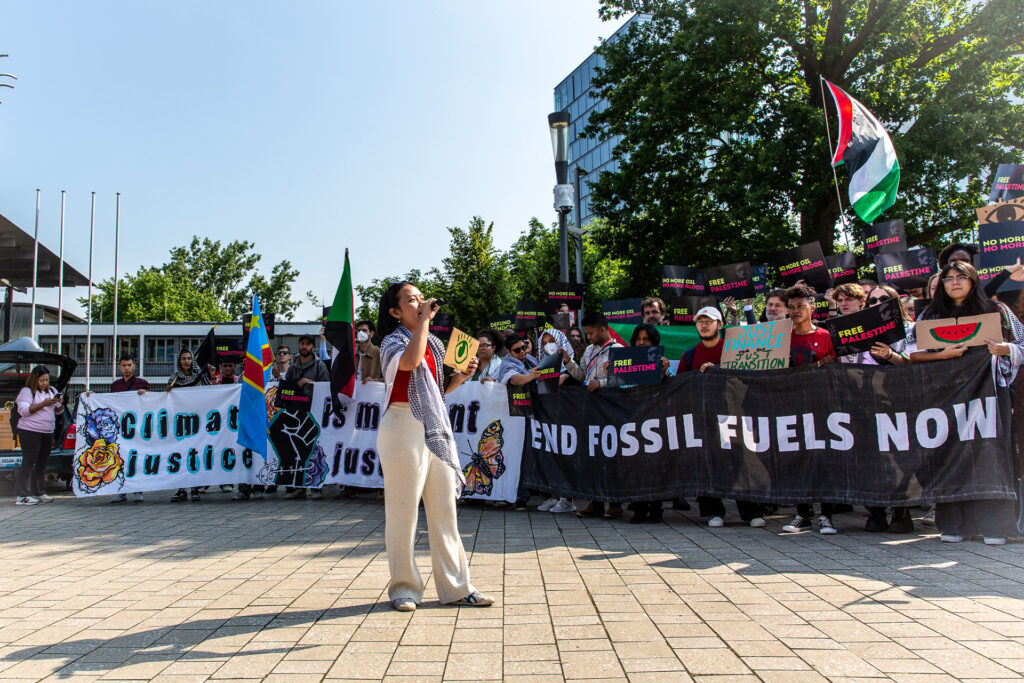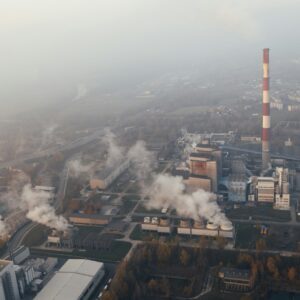When Azerbaijan was first announced as the host of the 2024 U.N. climate treaty talks (also known as COP29), the reaction was tepid at best. Is an authoritarian petrostate really the best candidate we have to lead negotiations for a world deep in climate crisis? As it turns out, it isn’t. What we got instead was an international climate conference overrun by more than 1,770 fossil fuel lobbyists – a number that eclipsed the delegations of almost every other country attending COP29.

Graphic that the coalition shared on social media plainly shows the injustice of the industry’s presence at the talks.
As the host, Azerbaijan used its oversight of the talks to promote fossil fuels and ram through false climate solutions like carbon markets, while simultaneously buckling down on its repression of civil society. COP29 also took place amidst accusations that Azerbaijan was committing ethnic cleansing of the Armenian population in Nagorno-Karabakh. So it’s no surprise that COP29 failed to deliver the climate action the world needs and what communities on the frontlines of the climate crisis are owed.
Instead, polluting corporations and countries like the United States – the world’s largest historical emitter of greenhouse gases and top producer of oil and gas – advanced false solutions like carbon markets, which effectively provide them with a get-out-of-jail-free card to keep polluting and sacrificing a livable planet for short-term profits. And now, barely three months later, Azerbaijan has announced that its state-owned oil company SOCAR is purchasing a stake in Chevron’s Tamar gas field in Israel – lighting another flame to a world on fire and fueling more genocide in the region.
Even before this announcement, Azerbaijan was already a top supplier of crude oil to Israel between 2020-2022, which is used to make jet fuel. Now, with this purchase, SOCAR directly owns a stake in a gas field that supplies the majority of fossil gas used for electricity generation in Israel – further entrenching Azerbaijan’s enabling of Israel’s violations of international law.

SOCAR filling station in Baku, Azerbaijan. The country’s economy is anchored in oil and gas production, which accounted for nearly 50% of the country’s GDP, and more than 90% of its export revenue in 2022. Image credit: Kheo17, Wikipedia commons
Here’s the thing: at the heart of our work and mission at Corporate Accountability is a vision of a world where people of all races, religions, and nationalities can flourish. A world where corporate power and systems of oppression have been dismantled, a world rooted in justice and love. Corporations like Chevron and SOCAR, along with governments like the United States and Israel, are furthering climate crisis and genocide, directly undermining the world we need and making all people less safe. And that’s why we need to expose and challenge these corporations and the governments that do their bidding; so that together, we can build a world that holds life sacred.
As the climate crisis intensifies, Big Polluters expand fossil fuel footprint
As the hottest year on record, 2024 was marked by extreme weather events in the U.S. and around the world including heatwaves, floods, hurricanes, droughts, and fires that have killed thousands of people and displaced millions more.
The climate crisis is intensifying at breakneck pace but major oil producing countries – including states like Azerbaijan – are further investing in fossil fuel extraction and abandoning their already-insufficient climate or renewable energy goals. In fact, in 2024, Chevron recorded a 7% growth in its production. As one of the world’s largest fossil fuel corporations, Chevron should be held responsible for its role in fueling climate change. But rather than use these profits to transition off of fossil fuels, Chevron’s executives are distributing these windfalls among its shareholders.
Profiting from death, destruction, and displacement

Activists gather outside of the climate intersessional meetings in Bonn, Germany to demand an end the Isreali government’s genocide in Gaza. Photo credit: David Tong, Oil Change International.
Grotesquely, Chevron is reaping these record-breaking profits over a year into the Israeli government’s latest intensification of genocide against Palestinians in Gaza – a genocide that the oil giant continues to indirectly prop up and financially benefit from with its businesses in the region.
In 2020, Chevron entered the Israeli gas market through its acquisition of Noble Energy, making it the largest transnational fossil fuel corporation with a significant stake in Israel’s energy sector. In 2023 alone, Chevron made an estimated $1.5 billion in revenue from the sale of gas pumped from the Tamar and Leviathan fields. Similarly, Israel also makes hundreds of millions of dollars in royalties and fees from Chevron’s extraction projects. The electricity produced from Chevron’s gas helps power Israel’s military infrastructure. And Israel’s apartheid regime also uses this very same electricity as a tool of war and subjugation – through denying access, providing lower-quality services, charging higher rates, or cutting power off entirely to Palestinians in Gaza and the West Bank.
The climate costs of these investments cannot be understated. In a completely peaceful world, continuing to extract fossil fuels would still prove to be catastrophic for the planet. But war and militarism are also significant contributors to a warming world. In fact, the first two months of Israel’s heavy military assault on Gaza alone generated more greenhouse gases than the annual emissions of more than 26 countries – further fueling the climate crisis globally.
Big Polluters like Chevron are no strangers to fueling destruction. Chevron’s business practices have not only decimated the environment, but also displaced Indigenous communities and threatened the health and livelihoods of people from around the world.
In Ecuador, our partners at the Union of People Affected by Texaco (UDAPT) are still demanding Chevron be held accountable for intentionally dumping 16 billion gallons of toxic wastewater into the Ecuadorian Amazon rainforest between 1964 and 1990. Meanwhile, in the U.S., emissions from Chevron’s oil and gas facilities have exposed communities to higher risk of asthma, heart disease, and chronic obstructive pulmonary disease (COPD) including in Richmond, California and Sweeny, Texas.
Its Israeli operations are no different. But rather than sell off its investment in Israel’s gas fields, Chevron has spent millions of dollars each year to lobby the U.S. government, including on energy issues related to Israel, and protect its interests.
Exposing, investigating, and taking a crack at Big Polluters’ bottom line
For decades, Big Polluters have wielded their immense wealth and power over governments to influence global politics and prioritize their profits over human lives and the planet. But the very same actors fueling genocide and climate change – including SOCAR, Chevron, and the United States – should be held accountable for the crises they have caused rather than dominate international policymaking.
This is one of the many reasons that Corporate Accountability’s climate campaign focuses on ending Big Polluters’ influence over climate policymaking. Alongside more than 450 allies, the Kick Big Polluters Out (KBPO) coalition organizes to demand a fast, fair, and fully funded phaseout of fossil fuels; an end to Big Polluters writing the rules; and for Big Polluters–including Global North governments like the United States–to pay their climate debts.
And over the years, together we’ve shifted the ground underneath Big Polluters at the climate talks. Thanks to KBPO’s organizing, all participants at the talks are required to publicly disclose who they represent in order to attend the meetings–a key first step toward broad accountability.
At the core of the devastation we are experiencing through the climate crisis, genocide, and endless wars is the corporate capture of our democratic systems and impunity for corporate abuse. For far too long, Big Polluters and the governments that do their bidding have polluted the environment and sacrificed the planet for short-term profits.
And in the face of rising corporate power and right-wing forces globally, we must continue to build a strong, broad movement of people committed to creating a world that does not depend on violence and extraction, but one that is rooted in cooperation, care, and the sacredness of all life.
As part of powerful movements with millions of people around the world, we are putting strategic pressure on corporations and governments to fundamentally reset the international system. Big Polluters like Chevron and polluting countries or oil exporters like the United States or Azerbaijan should not set the climate agenda whilst simultaneously expanding fossil fuel projects and fueling genocide.
It’s time to #KickBigPollutersOut of climate policy and #MakeBigPollutersPay for their harms. And we can do this in many ways: from calling on our elected officials to investigate the ways that Big Polluters have harmed our communities and hold them liable, to exposing the truth behind the so-called climate action that corporations rally behind.
We must continue to demand that the United States and governments around the world uphold their obligations in compliance with the Genocide Convention and immediately implement both an arms embargo and an energy embargo on Israel. And we can also exert pressure where it will hurt corporations the most: on their bottom line. Take action by joining people around the world to #BoycottChevron until it ends its support of genocide and apartheid in Palestine and climate destruction globally.




